彻底搞懂Java多线程(四)
实现1000个线程的时间格式化
package SimpleDateFormat;import java.text.SimpleDateFormat;import java.util.Date;import java.util.concurrent.LinkedBlockingDeque;import java.util.concurrent.ThreadPoolExecutor;import java.util.concurrent.TimeUnit;/** * user:ypc; * date:2021-06-13; * time: 17:30; */public class SimpleDateFormat1 { private static SimpleDateFormat simpleDateFormat = new SimpleDateFormat('mm:ss'); public static void main(String[] args) {ThreadPoolExecutor threadPoolExecutor = new ThreadPoolExecutor(10,10,100,TimeUnit.MILLISECONDS,new LinkedBlockingDeque<>(1000),new ThreadPoolExecutor.DiscardPolicy());for (int i = 0; i < 1001; i++) { int finalI = i; threadPoolExecutor.submit(new Runnable() {@Overridepublic void run() { Date date = new Date(finalI * 1000); myFormatTime(date);} });}threadPoolExecutor.shutdown(); } private static void myFormatTime(Date date){System.out.println(simpleDateFormat.format(date)); }}
产生了线程不安全的问题👇:
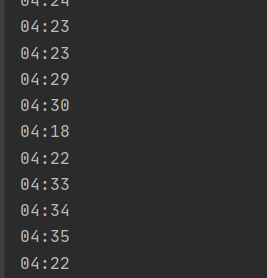
这是因为:
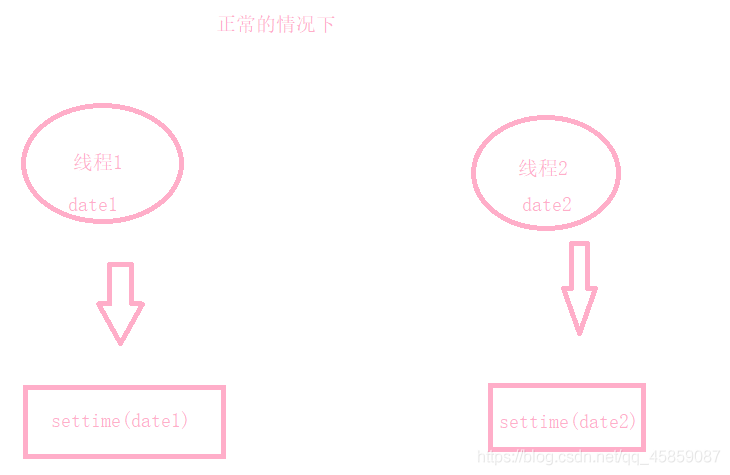
多线程的情况下:
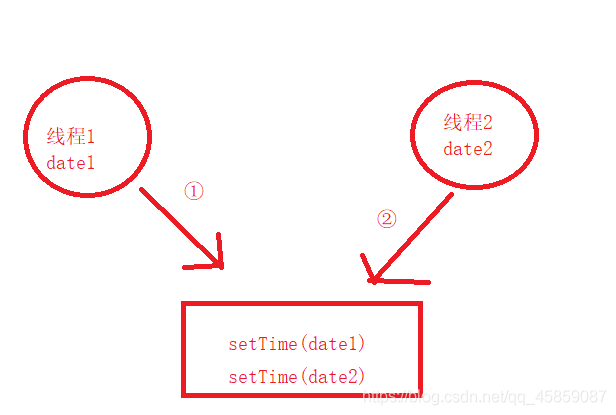
线程1在时间片用完之后,线程2来setTime()那么线程1的得到了线程2的时间。
所以可以使用加锁的操作:

就不会有重复的时间了
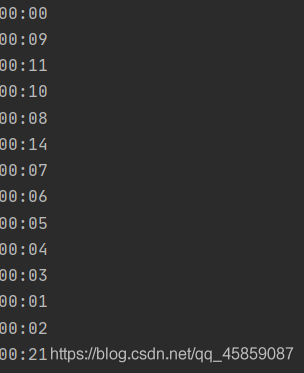
但是虽然可以解决线程不安全的问题,但是排队等待锁,性能就会变得低
所以可以使用局部变量:

也解决了线程不安全的问题:
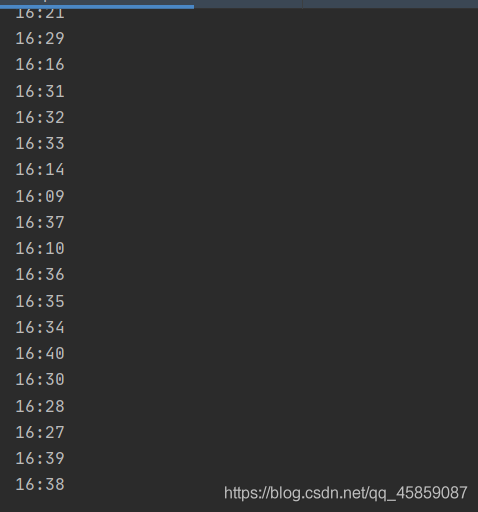
但是每次也都会创建新的私有变量
那么有没有一种方案既可以避免加锁排队执行,又不会每次创建任务的时候不会创建私有的变量呢?
那就是ThreadLocal👇:
ThreadLocalThreadLocal的作用就是让每一个线程都拥有自己的变量。
那么选择锁还是ThreadLocal?
看创建实列对象的复用率,如果复用率比较高的话,就使用ThreadLocal。
ThreadLocal的原理类ThreadLocal的主要作用就是将数据放到当前对象的Map中,这个Map时thread类的实列变量。类ThreadLocal自己不管理、不存储任何的数据,它只是数据和Map之间的桥梁。
执行的流程:数据—>ThreadLocal—>currentThread()—>Map。
执行后每个Map存有自己的数据,Map中的key中存储的就是ThreadLocal对象,value就是存储的值。每个Thread的Map值只对当前的线程可见,其它的线程不可以访问当前线程对象中Map的值。当前的线程被销毁,Map也随之被销毁,Map中的数据如果没有被引用、没有被使用,则随时GC回收。
ThreadLocal常用方法
set(T):将内容存储到ThreadLocal
get():从线程去私有的变量
remove():从线程中移除私有变量
package ThreadLocalDemo;import java.text.SimpleDateFormat;/** * user:ypc; * date:2021-06-13; * time: 18:37; */public class ThreadLocalDemo1 { private static ThreadLocal<SimpleDateFormat> threadLocal = new ThreadLocal<>(); public static void main(String[] args) {//设置私有变量threadLocal.set(new SimpleDateFormat('mm:ss'));//得到ThreadLocalSimpleDateFormat simpleDateFormat = threadLocal.get();//移除threadLocal.remove(); }}ThreadLocal的初始化
ThreadLocal提供了两种初始化的方法
initialValue()和
initialValue()初始化:
package ThreadLocalDemo;import java.text.SimpleDateFormat;import java.util.Date;/** * user:ypc; * date:2021-06-13; * time: 19:07; */public class ThreadLocalDemo2 { //创建并初始化ThreadLocal private static ThreadLocal<SimpleDateFormat> threadLocal = new ThreadLocal() {@Overrideprotected SimpleDateFormat initialValue() { System.out.println(Thread.currentThread().getName() + '执行了自己的threadLocal中的初始化方法initialValue()'); return new SimpleDateFormat('mm:ss');} }; public static void main(String[] args) {Thread thread1 = new Thread(() -> { Date date = new Date(5000); System.out.println('thread0格式化时间之后得结果时:' + threadLocal.get().format(date));});thread1.setName('thread0');thread1.start();Thread thread2 = new Thread(() -> { Date date = new Date(6000); System.out.println('thread1格式化时间之后得结果时:' + threadLocal.get().format(date));});thread2.setName('thread1');thread2.start(); }}
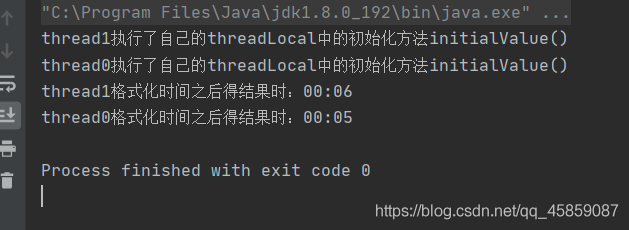
withInitial方法初始化:
package ThreadLocalDemo;import java.util.function.Supplier;/** * user:ypc; * date:2021-06-14; * time: 17:23; */public class ThreadLocalDemo3 { private static ThreadLocal<String> stringThreadLocal = ThreadLocal.withInitial(new Supplier<String>() {@Overridepublic String get() { System.out.println('执行了withInitial()方法'); return '我是' + Thread.currentThread().getName() + '的ThreadLocal';} }); public static void main(String[] args) {Thread thread1 = new Thread(() -> { System.out.println(stringThreadLocal.get());});thread1.start();Thread thread2 = new Thread(new Runnable() { @Override public void run() {System.out.println(stringThreadLocal.get()); }});thread2.start(); }}
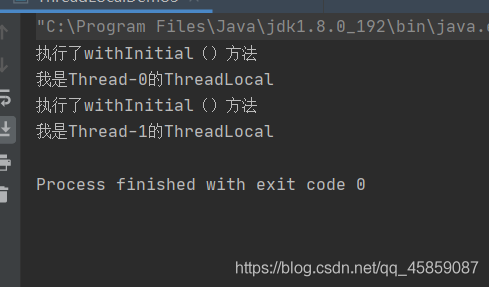
注意:
ThreadLocal如果使用了set()方法的话,那么它的初始化方法就不会起作用了。
来看:👇
package ThreadLocalDemo;/** * user:ypc; * date:2021-06-14; * time: 18:43; */class Tools { public static ThreadLocal t1 = new ThreadLocal();}class ThreadA extends Thread { @Override public void run() {for (int i = 0; i < 10; i++) { System.out.println('在ThreadA中取值:' + Tools.t1.get()); try {Thread.sleep(100); } catch (InterruptedException e) {e.printStackTrace(); }} }}public class ThreadLocalDemo4 { public static void main(String[] args) throws InterruptedException {//main是ThreadA 的 父线程 让main线程set,ThreadA,是get不到的if (Tools.t1.get() == null) { Tools.t1.set('main父线程的set');}System.out.println('main get 到了: ' + Tools.t1.get());Thread.sleep(1000);ThreadA a = new ThreadA();a.start(); }}
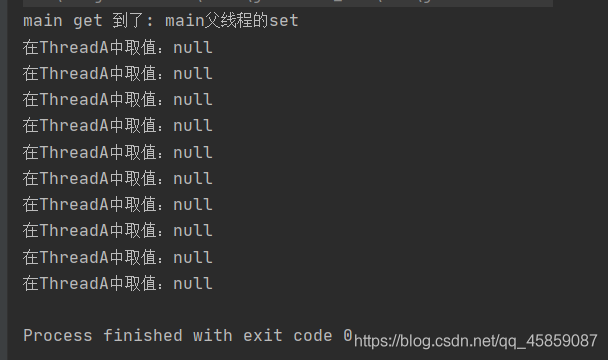
类ThreadLocal不能实现值的继承,那么就可以使用InheritableThreadLocal了👇
InheritableThreadLocal的使用使用InheritableThreadLocal可以使子线程继承父线程的值

在来看运行的结果:
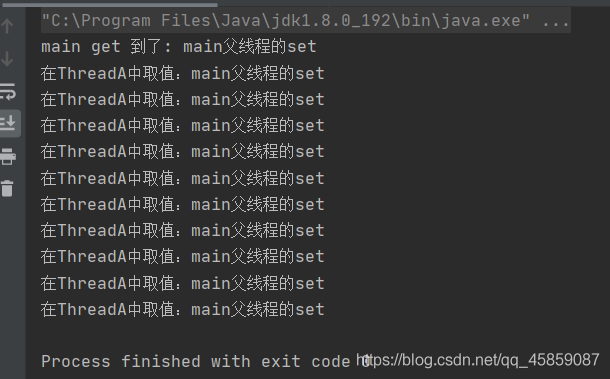
子线程有最新的值,父线程依旧是旧的值
package ThreadLocalDemo;/** * user:ypc; * date:2021-06-14; * time: 19:07; */class ThreadB extends Thread{ @Override public void run() {for (int i = 0; i < 10; i++) { System.out.println('在ThreadB中取值:' + Tools.t1.get()); if (i == 5){Tools.t1.set('我是ThreadB中新set()'); } try {Thread.sleep(100); } catch (InterruptedException e) {e.printStackTrace(); }} }}public class ThreadLocalDemo5 { public static void main(String[] args) throws InterruptedException {if (Tools.t1.get() == null) { Tools.t1.set('main父线程的set');}System.out.println('main get 到了: ' + Tools.t1.get());Thread.sleep(1000);ThreadA a = new ThreadA();a.start();Thread.sleep(5000);for (int i = 0; i < 10; i++) { System.out.println('main的get是:' + Tools.t1.get()); Thread.sleep(100);} }}
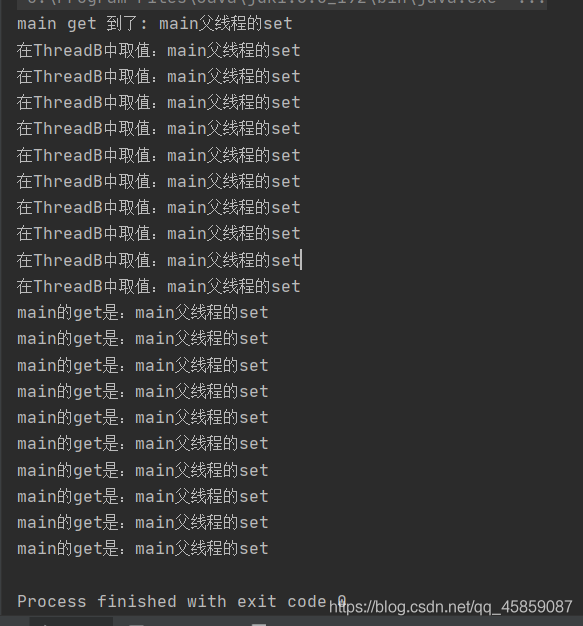
ThreadLocal的脏读问题来看👇
package ThreadLocalDemo;import java.util.concurrent.LinkedBlockingDeque;import java.util.concurrent.ThreadPoolExecutor;import java.util.concurrent.TimeUnit;/** * user:ypc; * date:2021-06-14; * time: 19:49; */public class ThreadLocalDemo6 { private static ThreadLocal<String> threadLocal = new ThreadLocal<>(); private static class MyThread extends Thread {private static boolean flag = false;@Overridepublic void run() { String name = this.getName(); if (!flag) {threadLocal.set(name);System.out.println(name + '设置了' + name);flag = true; } System.out.println(name + '得到了' + threadLocal.get());} } public static void main(String[] args) {ThreadPoolExecutor threadPoolExecutor = new ThreadPoolExecutor(1, 1, 0,TimeUnit.MILLISECONDS, new LinkedBlockingDeque<>(10));for (int i = 0; i < 2; i++) { threadPoolExecutor.execute(new MyThread());}threadPoolExecutor.shutdown(); }}
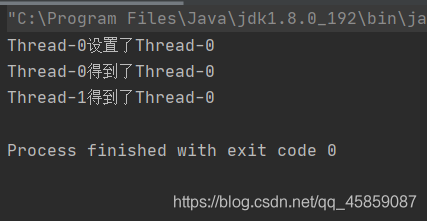
发生了脏读:
线程池复用了线程,也复用了这个线程相关的静态属性,就导致了脏读
那么如何避免脏读呢?
去掉static 之后:

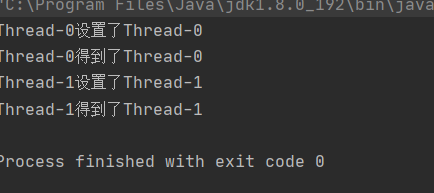
本篇文章就到这里了,希望对你有些帮助,也希望你可以多多关注好吧啦网的更多内容!
相关文章:

 网公网安备
网公网安备